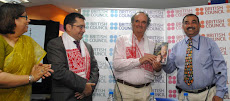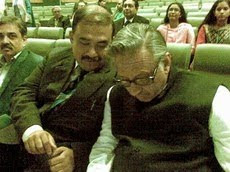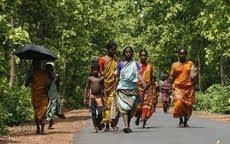For several months, this has been matter of intense speculation. As India developed its "strategic relationship" with the USA, it upset China so much that our northern neighbour started planning revenge action. After all, China feels the US is using India to encircle it strategically. There has been some stray reports of ULFA leaders meeting Chinese intelligence officials since the beginning of 2008 - but they were never confirmed. Now confirmation has been received of two meetings that ULFA commander in chief Paresh Barua, Manipur PLA chairman Irengbam Bhorot and All Tripura Tiger Force chairman Ranjit Debbarma had with senior Chinese military intelligence officials this year. Following which some guerrilla fighters of ULFA and PLA have left for China 's Yunnan province for training. Paresh Barua, ULFA C-in-C first flew to Kumming in Yunnan province from Dhaka and had two meetings with Chinese Military intelligence officials between 13-17 February this year. Then he flew into Beijing from Bangkok on 23rd May and was in the Chinese capital for four days. On both occasions, he was received by one Colonel of the Second Department of the Chinese Peoples Liberation Army General Staff ( that is the Military Intelligence Directorate) who introduced himself as Xiu Rongji (but could well be pseudonym). During his trip to Beijing, Barua was taken to The "Second Department" head office, which is located at No. 21, North Andeli Street, Beijing, The place is heavily guarded but has no signboards.
Paresh Barua, ULFA C-in-C first flew to Kumming in Yunnan province from Dhaka and had two meetings with Chinese Military intelligence officials between 13-17 February this year. Then he flew into Beijing from Bangkok on 23rd May and was in the Chinese capital for four days. On both occasions, he was received by one Colonel of the Second Department of the Chinese Peoples Liberation Army General Staff ( that is the Military Intelligence Directorate) who introduced himself as Xiu Rongji (but could well be pseudonym). During his trip to Beijing, Barua was taken to The "Second Department" head office, which is located at No. 21, North Andeli Street, Beijing, The place is heavily guarded but has no signboards. Barua was accompanied by Irengbam Bhorot, chairman of PLA (Manipur). The chief of Chinese Military Intelligence Department, one Lieutenant General Guangkhai gave them audience on two occassions. The Chinese general encouraged the Northeastern rebel leaders to regroup and step up recruitment and not be weighed down by current losses and setbacks; he also promised to train new recruits and provide latest weaponry. He told the Northeastern rebel leaders that India will never do justice to the smaller nationalities because they were never Indians but were colonised by the British and handed over to India after 1947. He also denounced India as an “US lackey” and said it is no longer an independent country.
Barua was accompanied by Irengbam Bhorot, chairman of PLA (Manipur). The chief of Chinese Military Intelligence Department, one Lieutenant General Guangkhai gave them audience on two occassions. The Chinese general encouraged the Northeastern rebel leaders to regroup and step up recruitment and not be weighed down by current losses and setbacks; he also promised to train new recruits and provide latest weaponry. He told the Northeastern rebel leaders that India will never do justice to the smaller nationalities because they were never Indians but were colonised by the British and handed over to India after 1947. He also denounced India as an “US lackey” and said it is no longer an independent country.
General Guangkhai’s argument sounds similar to the one in the controversial article of the website www.chinaiiss.org , which is the website of the the Institute for International Strategic Studies that is the research wing of the Second Department. This research institute is no independent think tank but its job is to produce for military intelligence an internal classified publication MOVEMENTS OF FOREIGN ARMIES [WAI JUN DONGTAI]. This is published every 10 days and transmitted to units at the division level.
These rebels are housed in a huge sprawling camp in Tinsum county of Yunnan province - not far from the quarters of the former leaders of Burmese Communist Party, who were settled by the Chinese in that area after the BCP broke up due to factional infighting and China stopped helping them after it developed direct state-to-state relations with Burma's military regime.
It is anybody’s guess what kind of training these rebels are receiving from China but general intelligence assessment suggests they would receive extensive training in (a) guerrilla warfare (b) explosives (c) espionage (d) select assassination (e) computer and electronics communication, Though these rebels will primarily operate against Indian security forces in the Northeast, some of them may be used by the Chinese to attack important Tibetan exile leaders in Indian territory. They may do this in coordination with already-infiltrated Chinese agents operating in India.
။ Photos : BBC News, Revolutionary People's Front of Manipur, Wang Jianmin (Xinhua)
( Subir Bhaumik is the BBC's East India Correspondent and a known military intelligence observer )







